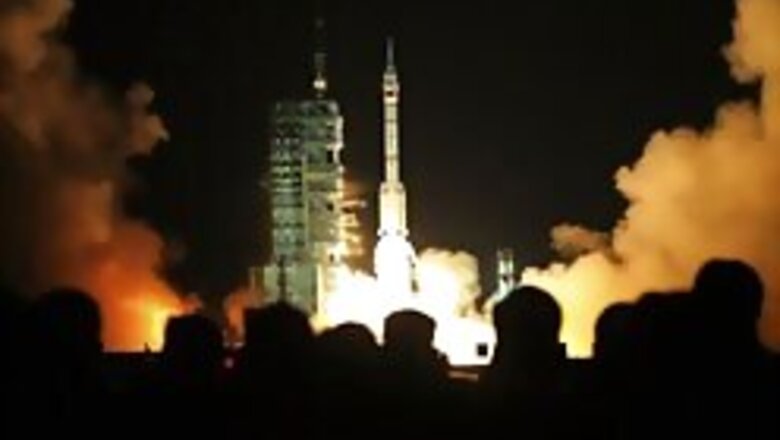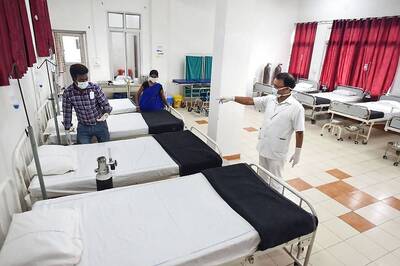
views
Jiuquan: China successfully launched a three-man crew into space on Thursday, including an astronaut who will make the country's first spacewalk.
The Shenzhou 7 spacecraft, China's third manned mission, blasted off atop a Long March 2F rocket shortly at 1310 GMT under clear night skies in northwestern China. The spacewalk is expected to take place either on Friday or Saturday.
Underscoring the mission's weighty political overtones, Chinese President and Communist Party head Hu Jintao was shown live on state television hailing the astronauts at the launch site near the northwestern town of Jiuquan.
''You will definitely accomplish this glorious and sacred mission. The motherland and the people are looking forward to your triumphant return,'' Hu told the three, who were dressed in their flight suits and behind glass to avoid germs.
Hu congratulated the astronauts and ground following the announcement of a successful launch 23 minutes after liftoff, calling that the ''first victory of the Shenzhou 7 mission.''
The launch was carried live on state television in a display of China's growing confidence in the 16-year manned space program. Shortly before the feed was cut, one of the crew reported in that all were in good condition and had extended the three-module craft's solar panels.
The mission, expected to last three or four days, is devoted almost entirely to the execution of the spacewalk, known formally as an extravehicular activity, or EVA. The event is expected to help China master the technology for docking two orbiters to create China's first orbiting space station in the next few years.
The spacewalk could happen either Friday or Saturday depending on how well the astronauts adapt to weightlessness and other physical demands of their environment, according to the China Manned Space Engineering Office. The walk will take place in the afternoon local time, with the astronauts returning to Earth soon afterward, the office said.
The two astronauts who don spacesuits for the spacewalk will be supported by Russian experts throughout the mission. Only one will actually leave the orbiter module to retrieve scientific experiments placed outside. One of the astronauts will wear China's homemade Feitian suit, while the other will wear a Russian-made suit.
Zhai Zhigang, an unsuccessful candidate for the previous two manned missions, has been touted by the official Xinhua News Agency as the astronaut likely to carry out the spacewalk, expected to last about 40 minutes. He is joined in the craft by Jing Haipeng and Liu Boming, who, like Zhai, are 42-year-old fighter pilots. A decade of training together ensured effective, smooth cooperation among the three, Liu said.
China's last manned mission, Shenzhou 6, came in 2005, two years after the country first put a person into orbit. Dean Cheng, an expert on the Chinese space program, said the additional year China took in launching Shenzhou 7 may reflect a desire for caution in the face of the complexity of engineering a spacewalk.
''This is part of a sustained, methodical effort,'' said Cheng of the Center for Naval Analyses Corporation in Alexandria, Virginia.
Before the launch, Chinese officials expressed a desire for closer cooperation with other nations in space. But some countries, especially the United States, remain dubious of the Chinese program's military backing and are keeping Beijing at arms-length on projects such as the international space station.
''The US concern is that cooperation with China could lead to a sharing of technology and expertise that could improve Chinese space and missile capabilities, which also could have military utility,'' the Union of Concerned Scientists, a US-based group that researches the Chinese space program, said in a report issued Tuesday.
China, meanwhile, sees such restrictions as excessive and believes the US aim is to ''slow the pace of China's overall economic and technical progress,'' the group said.

















Comments
0 comment